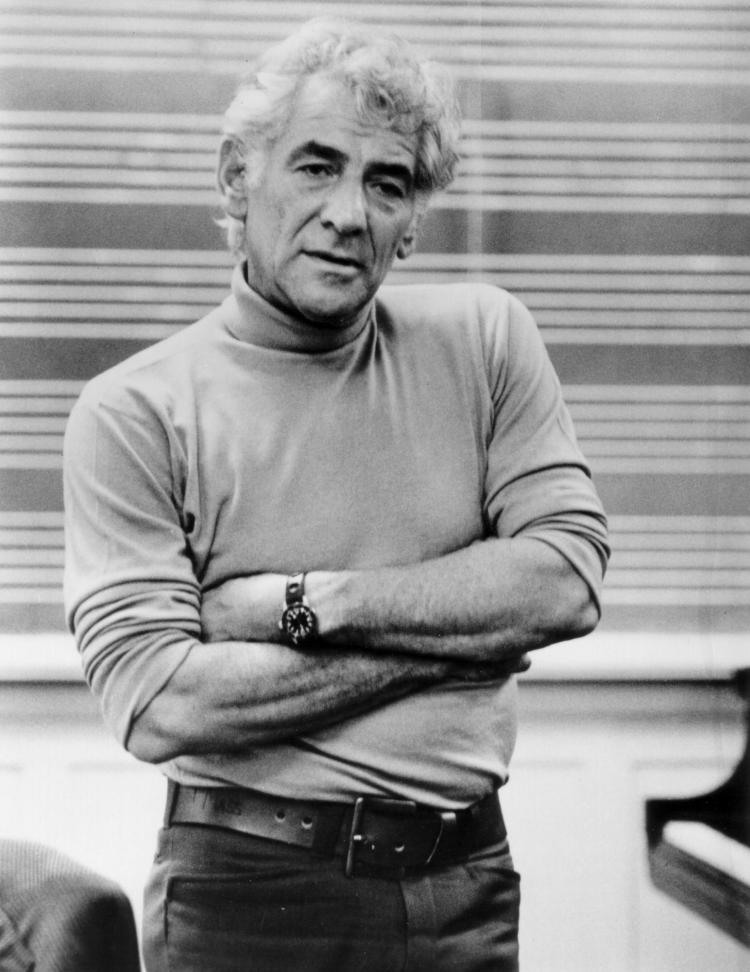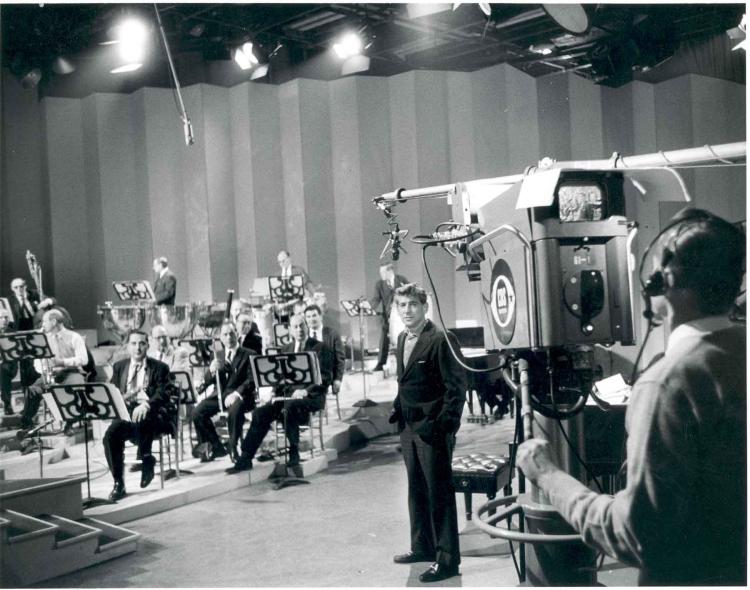Educator
Leonard Bernstein: A Born Teacher
by Jamie Bernstein

Photo by Paul de Hueck, Courtesy of the Leonard Bernstein Office
Leonard Bernstein was a man of many accomplishments, but he was proudest of his own achievements as a teacher.
There's a Hebrew phrase that makes me think of my father: "Torah Lishmah." And it means, loosely translated, a raging thirst for knowledge. I'm sure you've all had that feeling. Maybe you were researching a subject you were intensely interested in, and came across a document that went right to the heart of your thesis. Or maybe you just settled into your train seat with a big, juicy article in a magazine about your all-time favorite sports hero or movie star. Or the day after the first Presidential debates, you buy all the newspapers, nearly salivating with anticipation at reading all the spin.
That's Torah Lishmah. And Leonard Bernstein had it about almost everything! He just could not absorb enough information on the things that interested him: not just music but also Shakespeare, the Renaissance, world religions, Lewis Carroll, biology, Russian literature, the two World Wars, astrophysics, French drama — and any places where these topics overlap. His brain was on fire with curiosity. And what he loved most was to communicate his excitement to others.
Luckily for all of us, it wasn't enough for Leonard Bernstein to compose music and conduct orchestras. He felt equally compelled to talk about music — to try and explain what made it tick, what made it good, and what made it affect us in all the ways that music does. The other piece of good luck was that Leonard Bernstein and television came along at the same time. They were born for each other.

Photo by Bert Bial, 1958, courtesy of the Leonard Bernstein Office and the New York Philharmonic Digital Archives, Bernstein_with_TV_Camera
Bernstein's great gift was his ability to convey his own excitement about music. Watching him explain sonata form or the difference between a tonic and a dominant, you had the sense that he was letting you in on a wonderful secret, rather than drumming facts into you that might prove useful later. It doesn't matter what your subject is; a teacher's own passion is going to improve the student's ability to absorb and process the information. Excitement is contagious.
Of course, it helped a lot that Leonard Bernstein was really up on his subject.
People often say that Leonard Bernstein was a born teacher, but actually it's more accurate to say that he was a born student who just couldn't wait to share what he learned. In his whole life, he never stopped studying.
Leonard Bernstein had such facility as a teacher that he was sometimes not taken seriously as a scholar. But make no mistake; he really did his homework. As a young student, he applied himself at Boston Latin School, Harvard and the Curtis Institute of Music in Philadelphia. He made the most of his liberal arts education at Harvard, where he studied as wide a range of subjects as he could fit into his schedule. Leonard Bernstein really should be the poster boy for a liberal arts education; everything he absorbed seemed to inform his own music eventually. Later on, he absorbed mountains of knowledge from the various mentors in his life: Dimitri Mitropoulos, Serge Koussevitzky, Aaron Copland. But as well versed as he was in the field of music, he never shut down the learning factory. On the contrary; he stoked it up dramatically in the third quarter of his life.
In the 1970's, Bernstein turned himself back into a student again in order to prepare his six Charles Eliot Norton Lectures at Harvard. He immersed himself in Chomskyan linguistics, absorbing an entire new field of knowledge, so that he could then apply the principles of linguistics to music — thereby creating a brand new field of study, and turning himself back into a teacher again in the process. Ambitious? Oh, yes! Was he in over his head? Completely! He was never happier than he was in those 18 months on the Harvard campus, reveling in his dual roles as student and teacher.
My siblings and I have often thought that in a way, our dad was writing the Young People's Concerts to us. His last Young People's Concert was in 1972, in my sophomore year of college. And then, the following year, a funny thing happened: my father went back to college too! His residency at Harvard coincided exactly with my junior and senior years there, and my brother's freshman year. You could say that the Young People's Concerts turned into college lectures when his own kids became college age.
Interactivity is one area of teaching that has seen enormous expansion since the days of my father's Young People's Concerts. Back then, there was only so much you could do with a TV audience. Now that we're firmly in the age of interactive technology, we're in a sort of double bind. On the one hand, it's thrilling that a kid can have such an interactive relationship with his or her computer or video game or telephone. On the other hand, that kid's expectations in a classroom have been transformed. Kids have never been too good at sitting still, but now they really won't sit still for a simple, passive absorption of information. That will seem more deadly than ever before.
So we teachers have to work twice as hard to make our lessons engaging. In the process of trying too hard to seem modern and trendy, we can all wind up looking just as foolish as our own math teacher did back in the 1970's, when he grew his hair over his ears and wore bell-bottoms. Come to think of it, my own father did exactly that! But everybody loved him anyway.
But to get back to this business of interactivity. In spite of the limitations of television, Leonard Bernstein found plenty of ways to engage his audience directly. The easiest way was to engage the live audience, and he found wonderful ways to get them to participate — everything from singing "Frere Jacques" in a four-part round, to singing different intervals on the syllables "New York," to taking part in a musical quiz. You could feel the fizz of excitement when my father asked the concert audience to do something — and you can clearly see it on the DVD's of the televised Young People's Concerts, in director Roger Englander's delightful cutaway shots of the kids in Philharmonic Hall.
One thing I always loved about my father was how unafraid he was to be silly. In our family, goofiness was next to godliness. I wish you all could have seen him and his sister singing a song called "Toujours Glamour," with different gestures for each of the letters in "glamour." I wish you could have seen him playing the Pharaoh of Egypt, in a beach towel and lampshade crown, in my parents' epic home movie, "Call Me Moses." I wish you could have heard him tell the classic Jewish jokes, or describe his favorite Vaudeville routines.
But the good news is, you can see him acting pretty silly on his Young People's Concerts. The very fact that he came out in his nice suit and tie made any unusual behavior that much funnier.
Without a doubt, his best trick was singing the pop songs of the day to illustrate his points about the music of long ago. Oh, how the girls in the audience squealed with embarrassment and delight when he'd sing "And I Love Her" or "My Baby Does the Hanky Panky!" He knew he sounded ridiculous, but he truly didn't care, as long as it engaged the kids and helped them understand what he was talking about. That reflects a deep generosity of spirit — and everyone could sense it.
While talking to my brother about our dad's sense of humor, he pointed out that plenty of great teachers have been humorless. He reminded me that one of our dad's greatest conducting teachers, Fritz Reiner, was on the grim, dry side. But everyone at Curtis Institute adored Reiner and considered him a master. So maybe humor isn't a prerequisite. But with a young audience, it definitely helps — a LOT.
Are any of you familiar with the ideas in the book "Flow," by Mihaly Csikszentmihalyi? The subtitle is "The Psychology of Optimal Experience." His idea is that when we're completely engaged in a task that we find enjoyable, we enter a magical state where we lose all track of time, forget about our fatigue or our aches and pains, and produce our most creative and focused work. Leonard Bernstein was one of the luckiest people in the world, because so much of his work put him in that enviable state. Maybe as a result of being in flow so much of the time, he had a very heightened sense of the meaning of the word FUN. Fun was a serious thing to Leonard Bernstein — because he loved his work so much. And he was able to impart this sense of serious fun to everyone around him: his colleagues, his audiences, his students and his family.
So when my father talks in one Young People's Concert about the overture to "Marriage of Figaro" as "a roller coaster ride," he's not kidding! Conducting Mozart's music was every bit as thrilling to him as riding the Cyclone at Coney Island - and take it from me: he brought the same heightened level of engagement to both activities.
It may have been delightfully silly to hear my father squawk his way through those pop songs, but it also signaled to the audience that Leonard Bernstein listened to contemporary pop music — and liked it. That meant a lot in those days, when parents were turning up their noses at Elvis, Motown and the Beatles, and so-called experts would criticize popular music as brainless and even harmful. But hey: Leonard Bernstein thought the Beatles were great! And the Supremes too, and the Stones, and Latin American music, and African war chants and Louis Armstrong and Balinese gamelan and... well, that was exactly it: Leonard Bernstein loved music. ALL of it. And he gave a clear signal to his audiences that it was OK to love all music — and not to put a value judgment on one genre over another. He was the unsnobbiest person you could ever hope to meet. He loved people and was curious about everything. Those are good traits in a teacher.
In his own compositions, my father lived by the same creed. He wrote jazzy music for the concert hall and symphonic music for the Broadway stage. And of course, everybody thoroughly benefited from the cross-pollination — with the possible exception of Bernstein himself. In his lifetime, Bernstein's reputation as a composer suffered as a result of his refusal to be or do just one thing. In the mid- 20th Century, a composer who wished to be taken seriously by the academic musical community absolutely positively had to forfeit tonality in favor of 12-tone music. Simply put, they had to compose music with no key and no melody. Either you wrote 12-tone music or you weren't a "serious" composer.
My father set great store in the great academic institutions, and he longed to be counted in their pantheon. But he could not bring himself to give up writing a good tune. Aren't we glad now that he stuck to his guns?! You have to admire the man for trusting his instincts and writing from his heart, even if it meant losing respect. His courage and sense of self make a fine example for every student who seeks knowledge and dares to ask the hard questions.
Article courtesy of the Leonard Bernstein Office website.

